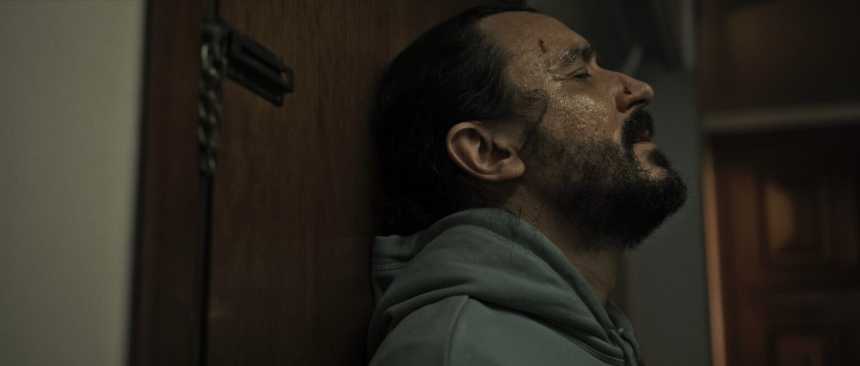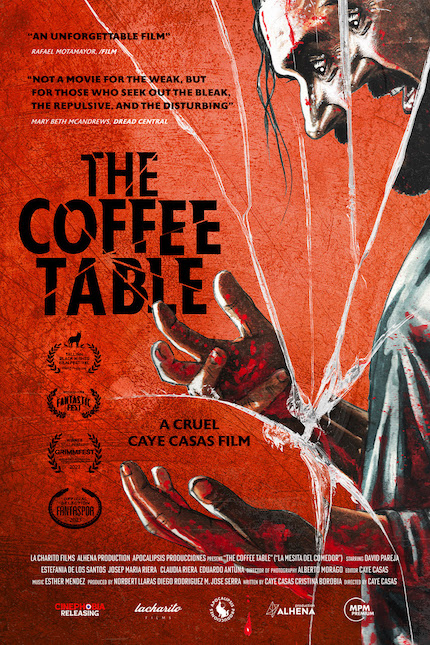THE COFFEE TABLE Review: Wallowing in Its Own Original Mess

New parents Jesus and Maria, still in the nesting phase after moving into a new apartment, need a new coffee table. Engaging with, or rather enduring, one of the oiliest, least competent, salesmen imaginable, it quickly becomes clear that the modest purchase has little do with with acquiring a cheap piece of faux-Swedish furniture (umlats abound), assembled in China, and everything to do with the changes in relationship dynamics that come with the birth of a child.
Maria has taken over the household in nearly every detail, and Jesus clings to the purchase of this gaudy piece of furniture to assuage his ego, or assert the tiniest sliver of masculine expression into their relationship. The salesman keeps repeating an ominous mantra, that this unbreakable glass table will change their lives forever. Maria is not only skeptical of his pitch, she is cruelly cynical, and verbally dismantles the salesman with a casual demeanour. She’s not wrong, she’s just an asshole.
What follows is a premise that seems ideal for a short film: setup, a gag or two, snappy climax. Here, however, things are blown out to feature length. This has both strengths and weaknesses.
On one hand there are several scenes, including a lengthy wine-shopping trip, that simply feels padded out to allow the film to hit the 90 minute mark. While there is a necessary plot reason for this to occur, there seems little need to show it on screen, and even less to add a pair of unnecessary characters who never appear again, and underscore themes that another pair of characters, the neighbours, better accomplish.
On the other hand, every little aside, including Jesus’ brother lengthy reminiscence of their He-man and Star Wars toys from the early 1980s, which decorate the baby’s room, is an opportunity to let Jesus (and us) to further marinate in the emotionally devastating pickle he soon finds himself trapped in.
Postpartum depression is no joke. The few films that have attempted this still taboo subject, think Paul Solet’s Grace, or Bess Wohl’s Baby Ruby, frame it as a psychological horror. Occasionally, it is done as a straight drama vehicle for an A-list actress, such as Charlize Theron in Tully or Amanda Seyfried in A Mouthful of Air. In all of these examples, the point of view is typically (naturally, obviously) from the new mother.
Director Caye Casas and screenwriter Cristina Borobia take a radically different storytelling risk. Framing the story from the new father’s point of view and emotional state, they structure the film as if it were a farcical comedy of errors, while simultaneously revolving the entire scenario around the discovery of a grim tragedy.
The film makes use of a fair bit of dramatic irony: we know (mostly) what has happened, but the mother, and the various visitors come to see the new baby over the day, do not. Thus, The Coffee Table is an exercise in extracting as much uncomfortable suspense out of the audience (and flat out suffering for Jesus) as it possiblly can.
It’s a parenting passion play that dares you to laugh, when it is never, ever, funny. I am sure there exist folks on the internet that will tell me I am wrong about this, and that comedy is subjective. The internet is going to internet, and the small niche that find the humour in this is a minority inside a minority. (You know who you are, and a bunch of dark fuckers.)
Outside of the opening prologue, and the aforementioned trip to the supermarket, The Coffee Table is essentially a one apartment location movie. The director throws every conceivable camera angle at the wall to keep the energy high, but so much unmotivated camera work becomes distracting after a point. This is coupled with a rather unlikable collection of characters, who flirt on caricature, but never quite achieve it.
Outside of the opening prologue, and the aforementioned trip to the supermarket, The Coffee Table is essentially a one apartment location movie. The director throws every conceivable camera angle at the wall to keep the energy high, but so much unmotivated camera work becomes distracting after a point. This is coupled with a rather unlikable collection of characters, who flirt on caricature, but never quite achieve it.
And yet, do any of these people deserve this fate?
Should we be laughing at their circumstance? On the other hand, with whom can we empathise? It is all rather unclear, both in the filmmaking and the performances. This, stretched out as long as the scenario allows, makes for a very conflicting and unsettling movie going experience. It is original in its own way. It is also the worst date movie, ever.
Should we be laughing at their circumstance? On the other hand, with whom can we empathise? It is all rather unclear, both in the filmmaking and the performances. This, stretched out as long as the scenario allows, makes for a very conflicting and unsettling movie going experience. It is original in its own way. It is also the worst date movie, ever.
The film begins its theatrical engagement on Friday, April 19, at Laemmle Glendale, with screenings in New York, Austin, and Chicago to follow. The Coffee Table arrives May 14 on DVD and VOD, via variuos platforms, all via Cinephobia Releasing.
La mesita del comedor
Director(s)
- Caye Casas
Writer(s)
- Cristina Borobia
- Caye Casas
Cast
- David Pareja
- Estefanía de los Santos
- Josep Maria Riera


Do you feel this content is inappropriate or infringes upon your rights? Click here to report it, or see our DMCA policy.







